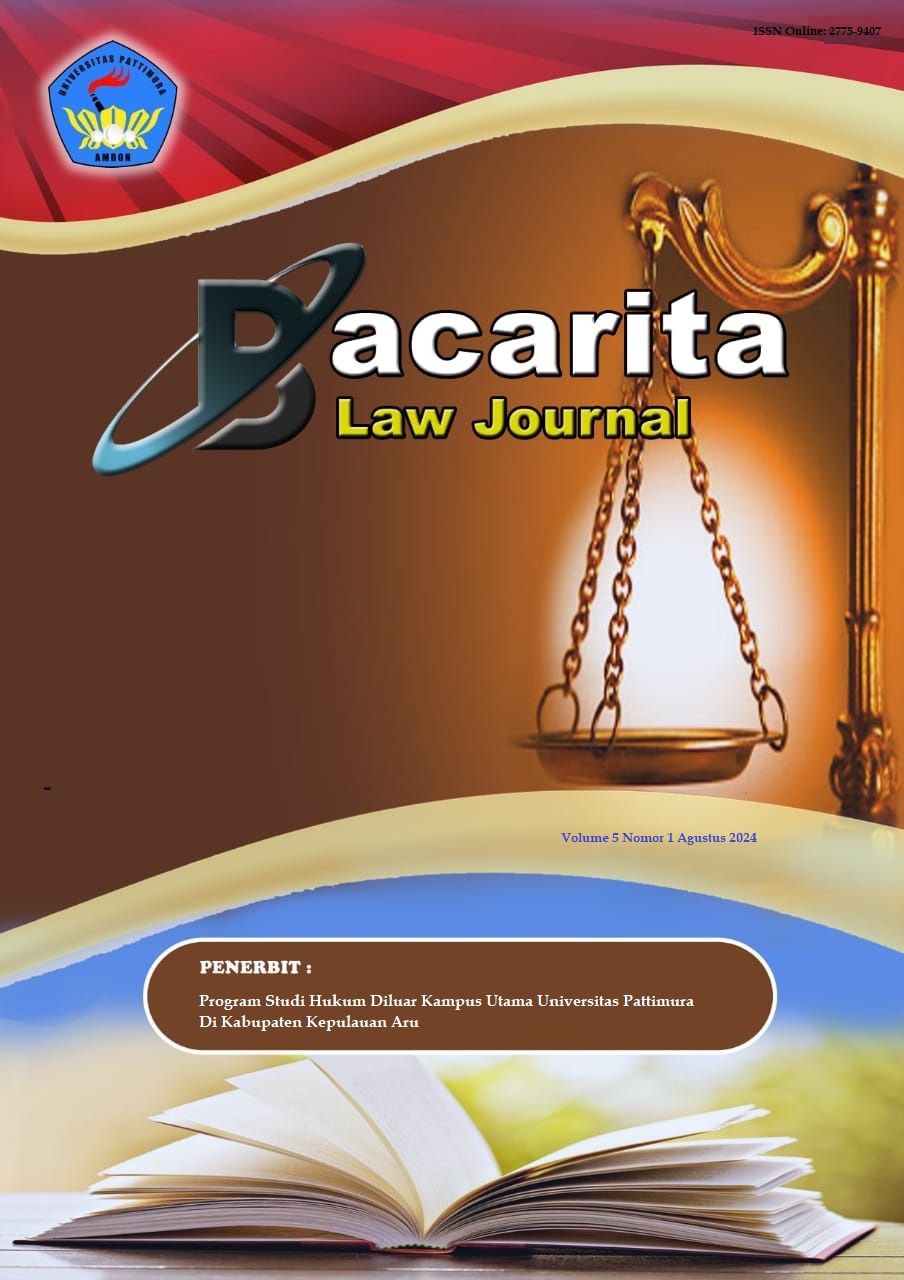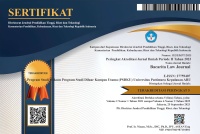Peran Analis Hukum Dalam Penyusunan Kebijakan Pada Kantor Wilayah Kementerian Hukum Dan Hak Asasi Manusia
Abstract
The formulation of effective and equitable public policies is one of the important aspects in ensuring the achievement of good governance objectives. In this context, the role of legal analysts in the Regional Office of the Ministry of Law and Human Rights (Kanwil Kemenkumham) has great significance. Legal analysts are responsible for ensuring that policies are not only in accordance with applicable legal norms, but are also fair, provide legal certainty, and respect human rights. Their main tasks include reviewing existing laws and regulations, identifying the potential legal impacts of proposed policies, and providing recommendations for policy improvements where necessary. In addition, legal analysts also play an important role in analyzing the possibility of legal uncertainty or regulatory conflicts that could harm society. Nevertheless, legal analysts are faced with various challenges, such as the complexity of overlapping regulations, rapid changes in social and political dynamics, and the need to accommodate different interests. Therefore, to improve policy effectiveness, capacity building and collaboration between various parties involved in policy-making are required, as well as continuous evaluation of policy implementation. Thus, the success of public policy is highly dependent on the ability of legal analysts to maintain a balance between compliance with the law and the fulfillment of community needs in a fair and responsive manner.
Downloads
References
Asep Abdul Aziz, Rida Nurfarida, Nurti Budiyanti, Qiqi Yuliati Zakiah (2020) Model Analisis Kebijakan Pendidikan. Jurnal Penelitian Ilmiah. Vol 4 No 2.
Asher, G., & Thompson, K. (2021). The Impact of Technology on International Law in the Age of Globalization. Global Policy Journal, 18(3), 245-260.
Badan Pembinaan Hukum Nasional. (2023). Strategi Pembaruan Hukum dalam Penyusunan Kebijakan Publik di Indonesia. Jakarta: Kementerian Hukum dan HAM.
Kementerian Lingkungan Hidup dan Kehutanan Republik Indonesia. (2020). Laporan Implementasi Perjanjian Internasional Lingkungan Hidup di Indonesia. Jakarta: KLHK.
Kurniawan, A. & Sari, I. P. (2019). The Role of Legal Analysis in Ensuring Policy Effectiveness: A Comparative Study. Social Policy Review, 13(5), 87-102.
Lestari, D., & Wijaya, R. (2021). "Penyusunan Kebijakan Hukum di Daerah dengan Keberagaman Budaya: Studi Kasus Sumatera Utara". Jurnal Hukum dan Masyarakat, 12(3), 220-235.
Nugroho, R. (2020). Kebijakan Publik dan Negara Hukum: Perspektif Indonesia. Jakarta: Penerbit Universitas Indonesia.
Mansouri, S. & Yuliana, N. (2021). The Role of Legal Experts in Policy Making: Avoiding Legal Missteps and Social Impact. Journal of Public Law and Governance, 15(3), 112-128.
Prasetyo, A. (2020). Analisis Hukum dalam Penyusunan Kebijakan: Memahami Tantangan dan Solusi di Indonesia. Jurnal Administrasi Negara, 41(1), 89-102.
Pratama, A. (2023). "Pentingnya Analis Hukum dalam Menyusun Kebijakan Publik yang Adaptif". Jurnal Ilmu Hukum, 15(1), 45-60.
Roeslan, H. (2020). Peran Analis Hukum dalam Pembuatan Kebijakan Publik di Indonesia. Jurnal Hukum dan Kebijakan, 7(1), 56-73.
Sadhana, Kridawati (2011) Realitas Kebijakan Publik. UM PRESS, Malang.
Salim, I. (2020). The Role of Legal Analysts in Public Policy Formation in Indonesia. Indonesian Law Journal, 15(1), 92-108.
Sari, R. A. (2022). Penyusunan Kebijakan Publik yang Berdasarkan pada Prinsip Hukum: Tantangan dan Solusi. Jurnal Ilmu Hukum, 29(3), 300-312.
Setyawati, T., & Hadi, D. (2020). Peran Analis Kebijakan dalam Penyusunan Kebijakan Publik di Indonesia. Jurnal Hukum dan Pembangunan, 50(2), 123-145.
Yuliana, D. (2023). Kebijakan Hukum dan Pembangunan Sosial: Tanggung Jawab Analis Hukum dalam Proses Penyusunan Kebijakan di Indonesia. Jakarta: Badan Pembinaan Hukum Nasional.
Copyright (c) 2025 Jordy William Hutagalung, Janpatar Simamora

This work is licensed under a Creative Commons Attribution-NonCommercial 4.0 International License.
Authors who publish their manuscripts in this Journal agree to the following conditions:
- The copyright in each article belongs to the author, as well as the right to patent.
- Authors are able to enter into separate, additional contractual arrangements for the non-exclusive distribution of the journal's published version of the work (e.g., post it to an institutional repository or publish it in a book), with an acknowledgment of its initial publication in this journal.
- Authors are permitted and encouraged to post their work online (e.g., in institutional repositories or on their website) prior to and during the submission process, as it can lead to productive exchanges, as well as earlier and greater citation of published work.
- Authors have the right to self-archiving of the article (Author Self-Archiving Policy)















